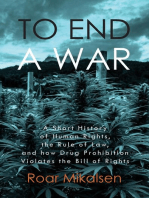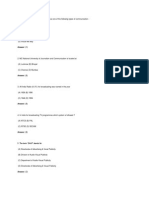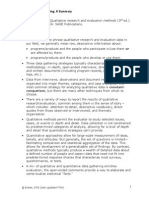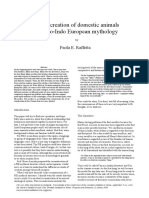Social Justice
Social Justice
Uploaded by
Jayjeet BhattacharjeeCopyright:
Available Formats
Social Justice
Social Justice
Uploaded by
Jayjeet BhattacharjeeOriginal Description:
Copyright
Available Formats
Share this document
Did you find this document useful?
Is this content inappropriate?
Copyright:
Available Formats
Social Justice
Social Justice
Uploaded by
Jayjeet BhattacharjeeCopyright:
Available Formats
The fair and proper administration of laws conforming to the natural law that all persons,
irrespective of ethnic origin, gender, possessions, race, religion, etc., are to be treated equally and
without prejudice. See also civil rights.
Social justice generally refers to the idea of creating a society or institution that is based on the
principles of equality and solidarity, that understands and values human rights, and that recognizes
the dignity of every human being.
Social justice is based on the concepts of human rights and equality and involves a greater degree of
economic egalitarianism through progressive taxation, income redistribution, or even property
redistribution. These policies aim to achieve what developmental economists refer to as more
equality of opportunity than may currently exist in some societies, and to manufacture equality of
outcome in cases where incidental inequalities appear in a procedurally just system. The
Constitution of the International Labour Organization affirms that "universal and lasting peace can
be established only if it is based upon social justice." Furthermore, the Vienna Declaration and
Programme of Action treats social justice as a purpose of the human rights education.
The term and modern concept of "social justice" was coined by the Jesuit Luigi Taparelli in 1840
based on the teachings of St. Thomas Aquinas and given further exposure in 1848 by Antonio
Rosmini-Serbati. The word has taken on a very controverted and variable meaning, depending on
who is using it. The idea was elaborated by the moral theologian John A. Ryan, who initiated the
concept of a living wage. Father Coughlin also used the term in his publications in the 1930s and the
1940s. It is a part of Catholic social teaching, the Protestants' Social Gospel, and is one of the Four
Pillars of the Green Party upheld by green parties worldwide. Social justice as a secular concept,
distinct from religious teachings, emerged mainly in the late twentieth century, influenced primarily
by philosopher John Rawls. Some tenets of social justice have been adopted by those on the left of
the political spectrum.
The term "social justice" implies several sound and eminently desirable concepts enunciated for the good of
society in general, and of course it covers fair play for every section, especially the weaker groups in the
population.
This seems unexceptionable and no one, however prejudiced or narrow minded, would object to the
promotion of this ideal. And yet the actions of countless people in this country, day after day, believe their
words.
The reckless flouting of the concept of social justice, and the denial of equal opportunities in life which this
postulates, all reflect a tendency that is anti-national and marks totally unfair and unjustified behavior.
In this defiance of the basic laws of human justice, the educated intelligent people are as guilty as their
ignorant, unlettered compatriots in the countryside.
We may start with certain provisions of the Constitution, which is the fundamental law of the land. The
preamble itself says: "We, the people of India, having solemnly resolved to constitute India into a sovereign,
socialist and democratic Republic and to secure to all its citizensJustice, social, economic and political...."
Clearly, social justice in all its forms and to all citizens was regarded as fundamental to the set-up which our
founding fathers prescribed for the country; it is mentioned on top of the other equally sound concepts, and
yet this very concept is being violated by countless people with amazing impunity, without fear.
In fact, many would say that it is absurd to talk of social justice in this country, because almost all the
traditional and prevalent systems are loaded against social and economic justice. The Preamble provides for
"equality of status and of opportunity...." In reality, neither equality of status nor of opportunity is assured.
There are distinct classes in society which stick to their privileges and refuse to share their riches and assets
with others, even while crores of people live in misery and perpetually groan under the burden of unfair
practices, unjust policies and gross inequalities.
The State, according to Article 15(1) of the Constitution, "shall not discriminate against any citizen on
grounds only of religion, race, caste, sex, and place of birth or any of them." The State, officially, indeed
does not differentiate between man and man on any of these grounds, but at the same time the government
and the administrative machinery have proved incapable of enforcing this provision.
How else are we to explain the countless cases of social and economic injustice, the increasing inequalities
in most spheres of human activity and the endless discrimination against the weaker sections of society,
especially Harijans and members of the Scheduled Castes and Tribes? The harassment and the cruelties
inflicted on them by landlords in the villages are common knowledge.
The lands granted to them have in many cases been grabbed by greedy people; and the equal rights
guaranteed to them under the laws of the land are denied to them by selfish people.
The pity is that the law and order machinery (the police) generally favors the richer classes and other
oppressors. No one actively takes up the case of the down-trodden people, despite the high-sounding laws
of the land and the impressive proclamations issued by the President of India and his ministers.
The reservations in government services, assured to the weaker sections of society, have not benefited the
really needy people, because there is virtually no end to impostors who wangle documents, certificates, the
facilities and grants given by the government.
The Benami transactions in land, the deceptions and the endless frauds in allotment of surplus land,
houses, plots, etc., all amount to denial of economic justice to lakhs of people urgently in need of relief. The
government passes laws for promoting social justice in various fields, but these are not strictly enforced;
thus the government may also be held guilty. It bows to various pressures.
Chapter III of the Constitution, entitled "Fundamental Rights", enumerates a series of rights which all
Indian citizens are supposed to enjoy, and yet the number of people who are able to enjoy these rights in
practice is much less than those who are denied their exercise. Their life continues to be one long, tragic
and heart-breaking story of deprivation and sufferings through official and public apathy.
Their colossal poverty is a permanent handicap which prevents them from seeking redress from the courts,
for grave wrongs done to them month after month by men in privileged positions, and also those who are
protected by the men in power; ministers and legislators, in effect their patrons. In other words, they are all
partners in the guilt and deserve to be hauled up for violating the Constitution and many other social
reform laws passed by the Parliament.
Article 23 of the Constitution specifically prohibits traffic in human beings, "begar" and other similar forms
of forced labour, and any contravention of this provision, it is stated, shall be an offence punishable in ac-
cordance with law. But how many people guilty of such defiance have beer, caught and punished? Economic
exploitation of labour continues with a vengeanceby capitalists, unscrupulous employers, landlords and
others, including senior government officials sand yet no one bothers. There is mere talk and promise, but
no concrete action to redress injustices.
Corruption itself is a form of exploitation, because people holding key positions extort money in the shape
of bribes, gifts and services, even for rendering simple services which are their duty. This process makes
total nonsense of "equality of opportunity" guaranteed under the Constitution. Only those who have money
can give bribes and grease the palms of greedy people.
The rest have to suffer through the bureaucratic ways, especially red tape, which in itself involves injustices
to the countless people whose petitions or applications are kept pending for months, sometimes years. And
yet, does anyone in this country suffer for causing harassment and frustration to these people through red
tape?
Wherever we may go, and whichever sphere we might study, we shall come across numerous cases where
justice has been continuously denied to innocent citizens. Are all those who cause such denial not morally
and legal guilty, and are they not punishable under the law? And yet, even the idea of hauling up highly
placed offenders does not occur to the powers that be. The hapless citizen, of course, suffers in silence. The
number of people in India who are suffering in silence must be legion. Almost the entire nation is suffering
in silence.
There is no discipline, and there are hardly any morals. The absences of these vital traits of character signify
the absence of social and economic justice. The argument that the police do not have their heart in the job,
because of the relatively low salaries they are paid and the fact that their own senior officials do not assert
themselves is hardly convincing. There is no sign of justice or fair play in any sphere of activity. It is
injustice and corruption on all over.
Justice is becoming scarcer with every passing year. The coming years hold little promise of restoring social
injustice in the country.
You might also like
- Youth Peace TrainingDocument41 pagesYouth Peace TrainingAwab SibtainNo ratings yet
- Piezoelectric Quartz Crystal SensorDocument29 pagesPiezoelectric Quartz Crystal SensorAllen Alaba100% (1)
- Duty To Access To JusticeDocument15 pagesDuty To Access To JusticeApple Abadilla100% (1)
- Manila Prince Hotel V GSIS DIGESTDocument2 pagesManila Prince Hotel V GSIS DIGESTzahreenamolinaNo ratings yet
- GROUP 4 Same Sex MarriageDocument14 pagesGROUP 4 Same Sex Marriagehoswereatiran2134No ratings yet
- Human Rights PaperDocument19 pagesHuman Rights PaperD Del SalNo ratings yet
- The Concept of Social JusticeDocument22 pagesThe Concept of Social JusticeIdrish Mohammed Raees100% (2)
- Child Marriage and The LawDocument11 pagesChild Marriage and The LawA y u s hNo ratings yet
- Presentation On Access To Justice and ADR in KenyaDocument16 pagesPresentation On Access To Justice and ADR in KenyaOmbudsman100% (4)
- Use Transition To Set 18 As Minimum Age: Yemen: End Child MarriageDocument1 pageUse Transition To Set 18 As Minimum Age: Yemen: End Child MarriageSandra Monica SturlaNo ratings yet
- CEDAW (Convention On The Elimination of All Forms of Discrimination Against Women)Document12 pagesCEDAW (Convention On The Elimination of All Forms of Discrimination Against Women)Angelyn Anna JojiNo ratings yet
- The Single Parent HouseholdDocument10 pagesThe Single Parent HouseholdAbu Saro DimasangkaNo ratings yet
- Philippine Commission On Human Rights National Inquiry ReportDocument38 pagesPhilippine Commission On Human Rights National Inquiry ReportHumanRights_Ph100% (1)
- Right To EducationDocument26 pagesRight To Educationjyoti_drall08No ratings yet
- LGBT Marriage: Does The Philippine Constitution Provide For Such ChangeDocument15 pagesLGBT Marriage: Does The Philippine Constitution Provide For Such ChangeMae Duffyne VenderNo ratings yet
- Violation of Human Rights in Education System and Its SolutionDocument8 pagesViolation of Human Rights in Education System and Its SolutionUmer ManzoorNo ratings yet
- Justice and FairnessDocument22 pagesJustice and FairnessCharles Ronald GenatoNo ratings yet
- Human Rights LAW: Quinnee S. VallejosDocument21 pagesHuman Rights LAW: Quinnee S. VallejosQuinnee VallejosNo ratings yet
- Social JusticeDocument29 pagesSocial JusticeMaria Margaret MacasaetNo ratings yet
- Role of NGO in Ensuring Access To Justice in BangladeshDocument15 pagesRole of NGO in Ensuring Access To Justice in BangladeshSarada BiswasNo ratings yet
- Difference Between Assimilation and AcculturationDocument3 pagesDifference Between Assimilation and AcculturationEj Rafael100% (2)
- Q&A On Magna Carta of WomenDocument7 pagesQ&A On Magna Carta of WomenEdman B. ParesNo ratings yet
- Definition of ADR:: V CIBC 1996 135 DLR 4th 471 (ONT Court of Appeal) 887574-'ADR' IsDocument19 pagesDefinition of ADR:: V CIBC 1996 135 DLR 4th 471 (ONT Court of Appeal) 887574-'ADR' IsOporadhBigganNo ratings yet
- Reflection On Sumilao CaseDocument3 pagesReflection On Sumilao CaseGyrsyl Jaisa GuerreroNo ratings yet
- State of The Justice System in The PhilippinesDocument3 pagesState of The Justice System in The PhilippinesAnonymous bIkjbI5VNo ratings yet
- The in Pari Delicto RuleDocument1 pageThe in Pari Delicto RuleLady BancudNo ratings yet
- Indigenous Environmental Movements and T PDFDocument17 pagesIndigenous Environmental Movements and T PDFWWWEEEENo ratings yet
- History of ASEANDocument19 pagesHistory of ASEANcinderellaistheworstNo ratings yet
- Gender Spectrum - Annotated BibliographyDocument7 pagesGender Spectrum - Annotated BibliographyGender SpectrumNo ratings yet
- NGO and Human RightsDocument10 pagesNGO and Human RightsAditi GoswamiNo ratings yet
- Right of DemocracyDocument4 pagesRight of Democracykaviyarasu457No ratings yet
- To End a War: A Short History of Human Rights, the Rule of Law, and How Drug Prohibition Violates the Bill of RightsFrom EverandTo End a War: A Short History of Human Rights, the Rule of Law, and How Drug Prohibition Violates the Bill of RightsNo ratings yet
- CitizenshipDocument6 pagesCitizenshipDev Pratap singhNo ratings yet
- Social Justice and The Constitutional Aspects of The Working Conditions of LaborersDocument11 pagesSocial Justice and The Constitutional Aspects of The Working Conditions of LaborersKt KateNo ratings yet
- Seminar FinalDocument13 pagesSeminar Finalammar123No ratings yet
- Are Socio-Economic Rights, RightsDocument8 pagesAre Socio-Economic Rights, RightsThavam RatnaNo ratings yet
- Do The Poor Get Justice in Our SystemDocument9 pagesDo The Poor Get Justice in Our SystemSuvidutt SundaramNo ratings yet
- SECTION: A (Reading)Document13 pagesSECTION: A (Reading)Akansha SarojNo ratings yet
- Aristotle - EssayDocument3 pagesAristotle - EssayyeiwjwjsNo ratings yet
- Module 7 - AnnotatedDocument4 pagesModule 7 - AnnotatedGD WestNo ratings yet
- People, Not The Government, Should Decide How To Organize Their Lives. Discuss.Document3 pagesPeople, Not The Government, Should Decide How To Organize Their Lives. Discuss.Zhang SiyuanNo ratings yet
- Chapter 6 - 10Document87 pagesChapter 6 - 10anonymousboylostNo ratings yet
- 2018, Voto Razonado E Informado. ¿Por Qué Y para Qué?Document3 pages2018, Voto Razonado E Informado. ¿Por Qué Y para Qué?CarlosNo ratings yet
- Philippines Bill of RightsDocument14 pagesPhilippines Bill of RightsMlazaga, KristanielNo ratings yet
- Comparison and Contrast Between The 1935 and The 1987 Philippine Constitution About Social Justice ProvisionsDocument10 pagesComparison and Contrast Between The 1935 and The 1987 Philippine Constitution About Social Justice ProvisionsthebeautyinsideNo ratings yet
- Know Your RightsDocument9 pagesKnow Your RightslyrkrishNo ratings yet
- Asiad CaseDocument12 pagesAsiad CaseShivi ShrivastavaNo ratings yet
- SSRN Id3793413Document25 pagesSSRN Id3793413aayushiNo ratings yet
- Readings On JusticeDocument8 pagesReadings On Justiceswayamb473No ratings yet
- Papers - Eco, Social, Cultural RightsDocument105 pagesPapers - Eco, Social, Cultural RightsRichard BalaisNo ratings yet
- Freedom Equality Justice-AnalysisDocument11 pagesFreedom Equality Justice-AnalysisKhushi Ingale100% (1)
- Public International Law and Human RightsDocument15 pagesPublic International Law and Human RightsKarishmaNo ratings yet
- 'Not An Illness Nor A Crime': Lesbian, Gay, Bisexual and Transgender People in Turkey Demand EqualityDocument50 pages'Not An Illness Nor A Crime': Lesbian, Gay, Bisexual and Transgender People in Turkey Demand EqualityLGBT Asylum NewsNo ratings yet
- Social JusticeDocument3 pagesSocial JusticefionaNo ratings yet
- What Are Social Rights?Document35 pagesWhat Are Social Rights?Anonymous HH9yyGp8ENo ratings yet
- Law and Poverty Assignment: Submitted By:mohammad Aazam B.A.LL.B (Hons.) Self Finance Roll No.-32Document8 pagesLaw and Poverty Assignment: Submitted By:mohammad Aazam B.A.LL.B (Hons.) Self Finance Roll No.-32TaiyabaNo ratings yet
- Equality Before Law From The Aspect of Economic, Social and Cultural RightsDocument8 pagesEquality Before Law From The Aspect of Economic, Social and Cultural RightsElda KurtagićNo ratings yet
- Declaration of Personal IndependenceDocument4 pagesDeclaration of Personal IndependencejamalNo ratings yet
- Sociology and SocietyDocument2 pagesSociology and SocietyJayjeet Bhattacharjee50% (2)
- Answer: (C)Document15 pagesAnswer: (C)Jayjeet BhattacharjeeNo ratings yet
- E-Commerce Web Site Design: Strategies and Models: KeywordsDocument8 pagesE-Commerce Web Site Design: Strategies and Models: KeywordsJayjeet BhattacharjeeNo ratings yet
- SolarLED Street Light SystemDocument10 pagesSolarLED Street Light SystemJayjeet BhattacharjeeNo ratings yet
- Application Format Final-1Document3 pagesApplication Format Final-1Jayjeet BhattacharjeeNo ratings yet
- Integrating Economic and Social Policy: Good Practices From High-Achieving CountriesDocument46 pagesIntegrating Economic and Social Policy: Good Practices From High-Achieving CountriesJayjeet BhattacharjeeNo ratings yet
- Qualitative GatheringDocument7 pagesQualitative GatheringJayjeet BhattacharjeeNo ratings yet
- Childrearing Practices: Creating Programs Where Traditions and Modern Practices MeetDocument69 pagesChildrearing Practices: Creating Programs Where Traditions and Modern Practices MeetJayjeet BhattacharjeeNo ratings yet
- Unit 2 Planning Process: 2.0 ObjectivesDocument14 pagesUnit 2 Planning Process: 2.0 ObjectivesJayjeet BhattacharjeeNo ratings yet
- Unit 6 Planning in India: Objectives, Strategies and EvaluationDocument23 pagesUnit 6 Planning in India: Objectives, Strategies and EvaluationJayjeet BhattacharjeeNo ratings yet
- Traditional and Modern SocietiesDocument2 pagesTraditional and Modern SocietiesJayjeet BhattacharjeeNo ratings yet
- Chapter-Viii 8.1. Housing & Urban Development Corporation (HUDCO) Limited Urban DevelopmentDocument13 pagesChapter-Viii 8.1. Housing & Urban Development Corporation (HUDCO) Limited Urban DevelopmentJayjeet BhattacharjeeNo ratings yet
- Manthan Topic: Future Cities: Ensuring World Class Civic Amenities in Urban IND "Document18 pagesManthan Topic: Future Cities: Ensuring World Class Civic Amenities in Urban IND "Jayjeet BhattacharjeeNo ratings yet
- Preliminary Study 1Document2 pagesPreliminary Study 1kleinNo ratings yet
- Eduqas Gcse Rs SpecDocument62 pagesEduqas Gcse Rs SpecJed ChukwuemekaNo ratings yet
- Jane EyreDocument15 pagesJane Eyreoffer eliNo ratings yet
- Colonial Advertisement ProjectDocument2 pagesColonial Advertisement ProjectBobNo ratings yet
- Assess The Impact of Darius I On The Administration of The Persian EmpireDocument2 pagesAssess The Impact of Darius I On The Administration of The Persian Empirecameroncans16No ratings yet
- The Western and Eastern Concepts of SelfDocument18 pagesThe Western and Eastern Concepts of SelfYeji Babe100% (2)
- Lecture 1Document25 pagesLecture 1Abdul Rehman Khan TareenNo ratings yet
- Dayal Samir DiasporaDoubleConsciousnessDocument18 pagesDayal Samir DiasporaDoubleConsciousnessGray FisherNo ratings yet
- The Legal Regime and Political Economy of Land Rights of Scheduled Tribes in The Scheduled Areas of India PDFDocument44 pagesThe Legal Regime and Political Economy of Land Rights of Scheduled Tribes in The Scheduled Areas of India PDFaditya vermaNo ratings yet
- Oath of OfficeDocument4 pagesOath of OfficeHananiah L. Padilla89% (9)
- Victors-crown-D - Hills SongsDocument2 pagesVictors-crown-D - Hills SongsJemuel RomboNo ratings yet
- Guide To Hell PDFDocument66 pagesGuide To Hell PDFit's me that guy100% (4)
- Jacques Vallee Interview PDFDocument14 pagesJacques Vallee Interview PDFalphatauri13100% (5)
- On The Creation of Domestic Animals in Proto-Indo European MythologyDocument3 pagesOn The Creation of Domestic Animals in Proto-Indo European MythologyStefan MihajlovicNo ratings yet
- Alphabetical List of English Proverbs - L-ZDocument5 pagesAlphabetical List of English Proverbs - L-ZHendra TaufikNo ratings yet
- Salaam 18012018125318Document26 pagesSalaam 18012018125318nitinrealNo ratings yet
- 10 ItemsDocument6 pages10 ItemsAce ArcegaNo ratings yet
- Arabian LiteratureDocument3 pagesArabian LiteratureMishie BercillaNo ratings yet
- Lifemadesimple PDFDocument125 pagesLifemadesimple PDFjyothiNo ratings yet
- Conversion From SinDocument5 pagesConversion From SinEdgar LavapiezNo ratings yet
- Hadith 2 - Sisters of HadithDocument14 pagesHadith 2 - Sisters of Haditha.asiyah.olaNo ratings yet
- Advantages of DecentralizationDocument2 pagesAdvantages of DecentralizationsherlexisNo ratings yet
- Futuwwah: Lessons To A Son of The MomentDocument64 pagesFutuwwah: Lessons To A Son of The MomentSaair SaleemNo ratings yet
- RZAL 1013 Module 5Document20 pagesRZAL 1013 Module 5Roshane Deil PascualNo ratings yet
- Let Nothing Disturb You Ferdzmb Complete - PDF PSALTERIONDocument2 pagesLet Nothing Disturb You Ferdzmb Complete - PDF PSALTERIONVylon Cuenco Balintag50% (2)
- The Red Cow The Quran and The MidrashDocument37 pagesThe Red Cow The Quran and The MidrashabbraxasNo ratings yet
- Conjuring - the.Devil.2020.HDRip - xvid.AC3 EVO 3Document82 pagesConjuring - the.Devil.2020.HDRip - xvid.AC3 EVO 3Lynn MyèttNo ratings yet
- Viladimir PrinceDocument4 pagesViladimir PrinceSamNo ratings yet
- Thesis Statement For Ancient EgyptDocument5 pagesThesis Statement For Ancient Egyptwssotgvcf100% (2)
- Islamic Jurisprudence IIDocument3 pagesIslamic Jurisprudence IIRomaisa khan SultanNo ratings yet






































































































